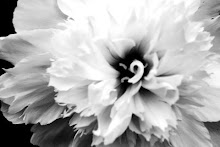Even the Rose,
beautiful,
healthy,
vibrant
and full of blooms
requires just enough manure
to flourish.
Grounded, by TR Hughes [1]
My friend Tammie wrote this poem, and its dirty truth made me laugh—reminding me, once again, of the duality that exists in all of life.
For instance, consider this botanical curiosity: Water Hemlock (sp., Cicuta) is considered to be the most deadly plant in North America. Yet its physical appearance shows delicate beauty.
Toxic Beauty (Water Hemlock) (c) 2008 by Melissa Johnson.
But woe is she who mistakes the clusters of white tuberous roots for that of parsnips or dill, both edible plants; a fatal error indeed. For when swallowed, water hemlock’s poison is so strong that it results in almost instant, violent and painful convulsions. Even handling the plant can leave high levels of toxins on the skin that—when inadvertently ingested by hand to mouth contact—will cause explosive vomiting, or worse. In fact, so toxic is this plant that, throughout history, it has been used as an intentional poison: Think Socrates’ execution in Greece by the deadly poison hemlock.[2]
And ponder this zoological wonder: Humans do not hold the title on laughter and joy. Chimpanzees, gorillas and orang-utans, our closest furry relatives, make laughing sounds when tickled, and they regularly play with each other, a discovery first reported by Charles Darwin in 1872. So while we humans are keen to distinguish ourselves from our animal friends, research shows that the determining factor for these seemingly cognitive functions is the size of certain regions of the brain—in particular, the amygdala—not the simple classification of animal or human.[3] After all, aren’t we and our monkey friends polar opposites on the same continuum of life?
Duality [doo-al-i-tee] The quality of being twofold; dichotomy.[4]
It’s not just the world of flora and fauna that breeds duality. We, as humans, are riddled with it. From the moment of our birth, the nature of our human experience is twofold—we are at once invisible spirit and a physical body. And while it has been said that we’re all created equal, our lives and experiences are so incredibly different, even in our similarities.
We experience our thoughts, emotions and actions in extremes: Love and hate, strength and weakness, hope and despair, ambition and laziness, happiness and sadness, kindness and cruelty; one moment we’re riding high on a wave of joy and inspiration and the next, feeling low of energy and lacking the will to get-up-and-go. The same is true of our experience of others.
There is a tendency, I think, to view people and situations as being this way or that; black or white; either / or, but not both. Yet the world is filled with dichotomies. How often have we met someone and, having seen certain positive qualities within them, we automatically ascribe to their character other positive qualities and exclude other more negative traits, only later to be disappointed when those negative traits emerge? Likewise, how often have we surprised ourselves with extremes of thought, behavior or desires, all coming from within?
The spiritual principle of non-duality suggests that these extremes are simply different expressions of the same energy. Picture it this way: A long string is stretched tight before you. On one end is your spiritual essence; on the other, your physical body. Though separated by string, they are opposing expressions of the same continuous thread of life, connected and inseparable as a whole. Ultimately, we wouldn't have an inner world without the opposing dynamic of an outer world. We can't have a front without a back; or a left without a right (unless, of course, we're dealing in one dimensional realities, like a cartoonist).
I think the challenge is in learning how to soften our hard lines--balance our extremes--and bring together opposing thoughts, emotions, and actions into perfect synergy to create a beautiful new life energy, rich in depth and meaning.
In this way, for instance, we view the water hemlock as a toxic beauty, equally fascinating in its ability to enliven our senses and destroy our life; we relax our minds enough to see that it's not a case of either / or; it is both.
And, like the rose, we learn to view the manure in our life as a smelly, messy, yet beneficial catalyst for our growth.
By Melissa Johnson
____________________________________
Notes and Resources:
[1] Riddles, Rhymes & Stop Signs, by TR Hughes. To purchase a copy of Tammie’s debut collection of poetry, please click here: Riddles, Rhymes, and Stop Signs by TR Hughes
[2] Wikipedia (http://en.wikipedia.org/wiki/Cicuta)
[3] Fish That Fake Orgasms and Other Zoological Curiosities, by Matt Walker.
[4] American Heritage Dictionary.




.jpg)


No comments:
Post a Comment